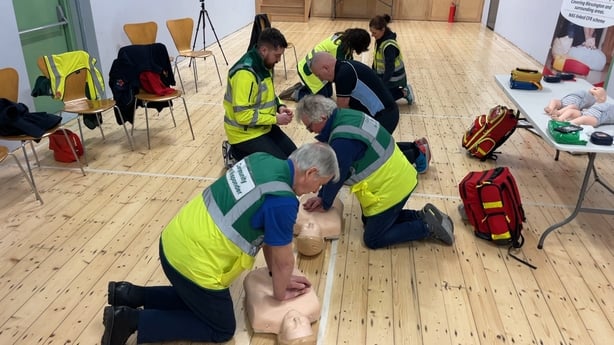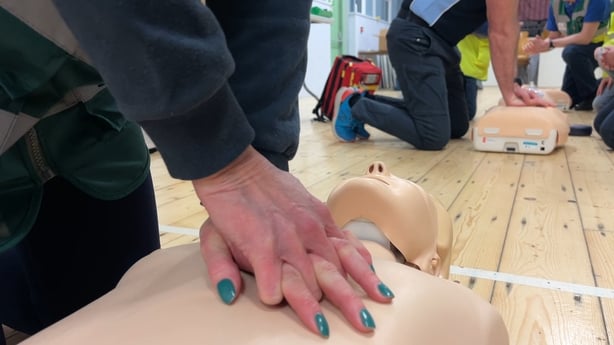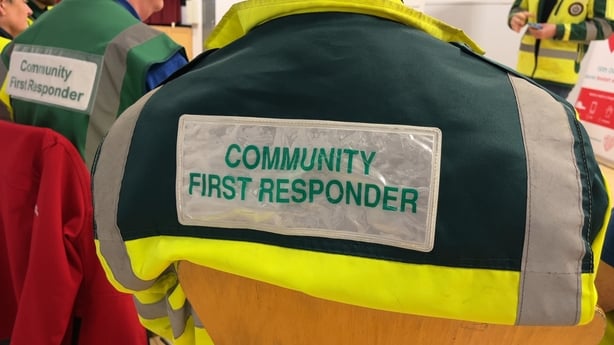Twenty years after the idea was first mooted in a Co Wicklow village, Ireland's network of community first responders is now made up of 4,000 volunteers in more than 300 groups nationwide.
Community first responders are volunteers who are trained to attend certain emergency cases in their local areas, following contact with emergency services. The callouts that CFRs attend are mainly cardiac arrests, chest pains and strokes.
In rural areas especially, first responders are able to answer an emergency callout and administer potential life saving medical attention before an ambulance arrives.
"It's not possible to have an ambulance outside every cardiac arrest," says John Fitzgerald, Chair of CFR Ireland which supports the operation of CFR groups across the country.
"Cardiac arrest survival rests in the community and what we are trying to do as a nation, with the help of the cardiac arrest strategy, is empower communities to start CPR (Cardio Pulmonary Resuscitation). We want communities to recognise an emergency and to start CPR.
"Then the next level would come if there's a Community First Responder group, and then of course the ambulance service has to come because the patient is very sick," said Mr Fitzgerald, who volunteers with the CFR group in Dunlavin, Co Wicklow.


The idea of setting up such a group came about in Shillelagh, Co Wicklow in 2004.
From there, a number of meetings took place across the county and in 2005, the first Community First Responder group went live in Co Wicklow.
All CFR groups are managed by the National Ambulance Service, which says that last year 310 groups around Ireland responded 12,249 calls.
Latest figures from the Out-of-Hospital Cardiac Arrest Register (OHCAR) show that in 2023, there were 2,857 out of hospital cardiac arrests incidents attended by emergency medical services, the majority of which happened in a private setting.
In terms of community involvement before emergency services arrived, the figures show that bystander CPR was administered in 85% of the cases in 2023, an increase of 25% from 2012.
The OHCAR report, which was published by the HSE, says that Community First Responders are "an integral part of dealing with an emergency in the community".
The National Ambulance Service, which works with CFR Ireland, oversees the establishment of any new first responder groups.
Volunteers come from all walks of life, with many having no professional involvement in the medical field. However there are also volunteers who do work as medics, and are involved with their local CFR group.
'It's a feeling like no other'
After he first moved in Blessington, Co Wicklow Simon Taylor became a CFR volunteer in 2005 to become more involved in the community and meet new people.
He joined the Blessington CFR group and every four weeks, volunteers in Blessington and surrounding areas take part in training sessions as part of a recommendation by the NAS to meet at least once a month. There, the volunteers debrief on calls made during the previous month and training on a specific topic is carried out.
Mr Taylor said that when attending a callout, the first responder administers the best possible care to a patient before an ambulance arrives. However there are times where in the end, the patient does not survive.
"I certainly found in my experience that the gratitude from the family doesn't always relate to the result," he said.
"Families are happy that there's somebody there trying to give somebody the best chance of survival in a very, very serious situation."

Attending a callout as a CFR is one part of what is known as a "chain of survival", a series of actions when treating a cardiac arrest patient, which aim to reduce mortality.
Mr Taylor said that it is a team effort when attending a call out, and described meeting someone after potentially playing a part in saving them as "amazing".
"It's a feeling like no other," he said.
"I've been involved in a couple of saves myself over the years and it's a feeling that will stay with me forever."
Mr Taylor said that there is a great sense of achievement in being a CFR, and that there is a great sense of community in working with other volunteers as well.
"It has its good times, it has its dark times but there's always a community there. There's always someone there who puts their hand on your shoulder after a bad callout and gets you through it.
"I've seen the importance of it in communities and that would be my reason for being involved and still being passionate about it."
Information on becoming a Community First Responder is available on becomeacfr.ie





